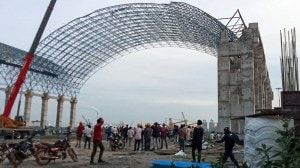Sensex dives as AP disinvests in Naidu stock
Dalal Street panicked on Tuesday as a spectre of hung Parliament and the rout of NDA ally TDP in Andhra Pradesh had bears roaring back and t...

Dalal Street panicked on Tuesday as a spectre of hung Parliament and the rout of NDA ally TDP in Andhra Pradesh had bears roaring back and the benchmark Sensex tumbling 230 points to a 46-month low of 5325.90.
With final exit polls indicating that the NDA may not get a majority, fears of a slowdown in economic reforms and foreign investment saw investors scrambling to exit from the market. As a result, investors wealth — market capitalisation or total market value of all listed shares — plunged Rs 60,000 crore in a single day. The index plunged in the opening minutes itself and nervousness mounted as the Andhra Assembly results came in. Banking stocks and state-run firms were the hardest hit on concerns that the pace of reforms will suffer in the event of political instability.
‘‘The market at this moment is very sentiment driven. The long-term trend still is good… but an investor should wait till the final outcome. This is not a time to panic,’’ said Sanjay Prakash, CEO, HSBC Mutual Fund.
Recording its worst fall after July 24, 2000, the 30-share BSE Sensitive Index (Sensex) eventually ended with a massive loss of 229.94 points, or 4.14 per cent, at 5,325.90. The NSE S & P CNX Nifty Index shed 69.65 points, or 3.94 per cent, to end at 1,699.45.
Investors ran for cover as political uncertainty heightened after the TDP ouster because it’s being seen in the market as a pointer to general election results.
Besides, amid the political uncertainty and hopes of an imminent rise in the US interest rates, foreign funds stepped up selling on bourses. On Monday, FIIs pulled out Rs 595.20 crore from Indian bourses.
They had pulled out a net Rs 168 crore on May 7 after selling shares worth Rs 14.90 crore on May 6, taking the total outflow in the last three days to Rs 778 crore (around $ 175 million). FIIs were heavy sellers on Tuesday too.
With this, the Sensex has lost 431.40 points in the last three trading sessions. From a recent high of 5,979.25 on April 23, the Sensex has lost 653.35 points, or 10.92 per cent, amid political uncertainty.
Bank and public sector unit stocks which bore the brunt of the selling pressure fell by 4-7 per cent. Even market leaders like Reliance, Hind Lever and others were also not spared. Though the market was full of sellers, fund managers expressed the optimism that the situation would be back to normal soon.
Said Ved Prakash Chaturvedi, CEO, Tata Asset Management: ‘‘The market is reacting to the news flow in the three major areas: politics, monsoon and the international market. All the three are uncertain areas to even predict. But the news from the domestic sector is good, so given this situation, I think, the market should stabilise in next three months.’’
‘‘This is a typical reaction by speculators. Personally, I think whichever government comes to power it will not affect vast sectors of the economy. A new government may tinker a bit, and important projects like the Golden Quadrilateral and networking of the rivers may take a backseat. But fundamental industries like automobiles, pharma and oil & gas will not be affected much,’’ maintained Krishnamurthy Vijayan, CEO, JM Mutual Fund.



- 01
- 02
- 03
- 04
- 05




























